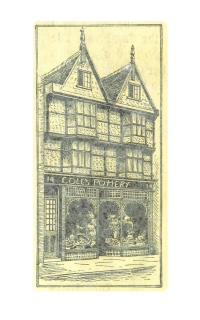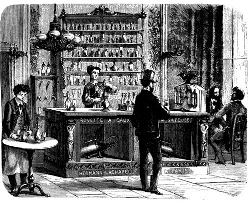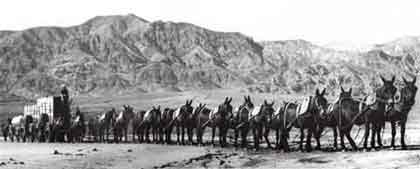"Come on!" Breathless, Merrida grabbed my arm and tugged. The evening watch was nearly upon us, and with it, dusk. It was almost time to go home, and she'd just ran half way across campus, only to find me in the library, still studying. "There's an open seat for next month's exams! Hurry! We've got to get there before they lock up."
"But…"
"If you don't pass you can test again, and you'll know what to expect. Come on!"
I hastily packed my things. Merrida then half dragged me across the icy quad to the administrator's office where, to my complete astonishment, the door was still unlocked, and the seat was still open. After I finished registering, we hugged excitedly. She invited me to meet her family and have dinner with them the following week. Then, with a promise to breakfast together at the Blue Jacket in the morning, we had parted for the night. Ten minutes later I was in a hansom cab headed home.
By the time it slid to a stop in front of the potting shop it was dark, though the Clock Tower was only tolling out two bells. What little warmth there had been in the winter wind was now gone. The night air was freezing cold, turning the ice on the streets and sidewalks into solid glass. As for me, I was still in a state of wonderment. I had made a new friend, and had even agreed to meet her family, I had a date to sit for my exams, and I now had study materials that drastically improved my chances of passing. Now, it was time to tell my family.
When I opened the shop door, the first thing that hit me was the smell of dinner. Edwards had been starting one of his stews when he'd served me the coffee and sweet roll that morning, so it had been cooking all day. I was about to comment, but was prevented by the elderly woman my mother tended at the counter.
"Oh yes, yes I see," she was saying. Her name was Mistress Alder, and she was one of thousands of war widows in the city. She'd been coming to the shop for years; today, she had a broken washing basin in front of her. "Yes… Beatrice must learn to be more careful, yes. That will be fine, Mistress Cole." She patted the pockets of her skirt absently for a moment, then turned to leave and spotted me. "Oh! Good evening, Barbara!"
"Mistress Alder," I replied politely as I passed behind the counter. "Dropped that one on your Sudaani rug, did she?" It was more of a statement of fact than a question. Beatrice was her servant of all work. Breaking pottery seemed to be one of her few talents. That the basin had hit something soft was evident -- to my eyes -- by the way it had broken.
"Oh!" Mistress Alder replied slowly, eyeing the bowl more closely. "Yes. Quite right. Very clever, my dear." Then she gave me similar scrutiny, her pale blue eyes boring in with practiced precision. "And you've been studying at the academy library all day."
It wasn't really a question for the same reason my observation about how the washing basin had been broken wasn't really a question. Mildred Statham-Alder wasn't just a war widow. She was also a retired detective chief superintendent who, like me, had never been to college, and had never served in uniform. She had passed her exams, studied hard at the academy, and started her career as a police inspector. In police circles, she was still highly respected for her work cracking some of the biggest cases of profiteering and corruption of the war. She was my inspiration, and in some ways, a mentor.
"I'm scheduled for my inspector's exams next month," I blurted proudly, and rather more excitedly than I had intended.
"Oh good!" Mistress Alder poked a finger into my chest, albeit fondly. "You'll make a fine police inspector, my dear. You've got the mind for it." Then, deducing that we wanted to get to our dinner every bit as much as she wanted to get to hers, she again patted her pockets with both hands, nodded politely, and with a "Well, good evening, then," left the shop.
Mother rounded on me as soon as the door clicked shut. "You didn't tell me that! Next month?"
"Yes, Mother. I signed up today. I either test next month, or I have to wait until after SummerFest—and it's not like I can't do it again then if I fail!" I said in protest, already dreading what was to come.
Mother gave me "that look" as she jammed the deadbolts home on the street door and turned the sign so it said "CLOSED".
"I hate surprises, Barbara. I had enough of that after your father came back from the war," she said, once again rehearsing her well-worn diatribe. "By the time we got him home he was a wreck! The physical injuries had mostly healed, but those nightmares!And then there was the unpredictability. A body never knew whether you were going to get a hug or a slug. Valïa strike me down if I lie!"
She was still gesticulating wildly as she headed into the back of the shop, and I dutifully followed. I was only nine when my father came home from the war, so I don't remember many details. I remember mother doing a lot of crying, and working long hours in an attempt to keep the shop going while also taking care of Dad at the same time. I did my best to help, but really, beyond feeling horrible, there wasn't much I could do.
As for the present, the surprise of the early test wasn't the only the problem, or even the biggest. The big one was money! If I passed my exams, I would be expected to attend classes in uniform, and I would also be in uniform during my short tenure as a beat cop. Only then would I be able to go back to wearing my well-curated collection of business suits—all of which had been bought used, and most of which showed signs of wear. New uniforms, you see, were like new suits. They cost as much as a decent horse, and I would need two: One to wear to school while the other was being cleaned and repaired.
We couldn't afford a horse.
"So, my girl, you have a testing date!" Dad called from the back of the workshop. The journeymen and apprentices had just left and he was locking the back door.
"I do," I replied soberly.
Mom was right in front of me, her flustered state radiating out ahead of her in waves. "I don't know how we're going to afford it. I do not!" she fussed.
"We'll afford it, my dear," Dad assured her, rejoining us to head up to dinner. "Don't you worry about that!"
"But I am worried, you old fool!" Mother shot back as she followed him up the stairs. "Two new uniforms? Valïa's breath how are we supposed to afford that? And what if she flunks out of school? Two perfectly good uniforms and all that money wasted."
Edwards already had the table set by the time we entered the kitchen. A loaf of fresh, hot bread sat proudly on a cutting board at the center of the table, along with a large cake of soft butter. We each took our turn at the washbasin in the corner before sitting down.
"I wouldn't be the first to flunk out," I replied to Mom's worry as I took my turn washing my hands. "Which means there must be other families that have unused police uniforms lying around."
"You see?" Dad beamed. "Clever girl. She already has a plan. I knew she would."
"So she buys them used," Mother huffed, unconvinced. She held her bowl up for Edwards to fill with his fragrant stew. "She needs two, and that's still more than we can afford. I didn't manage things around here while you were off in the war just to see it all go to the money lenders because your daughter fancies herself above her station."
"Mistress Alder doesn't think becoming an inspector is above my station," I countered.
"Nor should she," Dad said. "Why shouldn't our girl reach for better?" he asked Mother. He meant it rhetorically, but Mother took it literally.
"Because we can't afford it," she insisted. "It would do her good to work a beat for awhile. I've said it before. She should earn her way to an inspector's badge, same as everyone else. It would be different if she were earning wages. But to put out ten or twenty pounds on school clothes? Really!"
This was an old saw with my mother, whose world view had been forged during wartime. She had done lots with very little and saw no reason why everyone else couldn't do the same. With the return of my father's health had come the final victory in Ameran Indi, and in his opinion if the fruits of that victory weren't to be enjoyed, then for what had we spent a century fighting?
"My dear," he said to me, "you prepare for your test. One thing at a time, Mistress Cole," he added, cutting off Mother's next diatribe before it began. "Let us not spoil for a fight that may never happen. First, she must pass her exams."
"That's naught but encouraging her!" Mother said, fuming. "If you want to do right by your daughter, you'll encourage this no further."
"I am encouraging her to do no more than be the best she can be," Dad replied calmly. "The war is over, my dear. With the peace, business all over the city is now booming, and like our girl here, I have a scheme for how we might acquire uniforms without undue expense or exertion."
Mother looked at him skeptically. I arched an eyebrow. "Father?"
He beamed beatifically. "I haven't had time to tell you," he said apologetically to Mother. "Goodman Kiaran Savidge-Clarke, he of Savidge & Clarke Yards, has just landed a contract with Berne-Tash Lines to convert the warships they've bought at auction into freighters and passenger liners. As a result, I have a private appointment with him tomorrow to discuss new a new dinner service for he and Mistress Clarke in celebration of their twentieth anniversary."
"And what is that to the purpose?" Mother demanded to know.
"Goodman Kiaran has a daughter in the force, and the servant who called today told me she just got her promotion to inspector. Miss Dodie will not be needing her blues any longer, and you and she—" he nodded to me— "are, I think, of a size."
"You think she'd part with them?" I asked excitedly. Across the table, mother wilted. Her last hope of using money as leverage to make me work my way up as a "blue jacket" was fading fast.
"I think she might be persuaded," Dad nodded. "Kiaran and I were both in the Fifty-Seventh, which is why he came to us for the plateware."
He reached out to take my hand reassuringly. "I'll talk to him, don't worry," he said. "You pass that test!"
I could barely wait to tell Merrida! Suddenly, tomorrow's breakfast seemed a long way off.
Next time: The accident!
Don't forget to subscribe to The Menelon Gazette to stay up-to-date with all our offerings!
The Menelon Gazette
If you are interested in more content like this (plus freebies, access to premium content etc.) subscribe to our newsletter for more from the world of Menelon and its creators!



